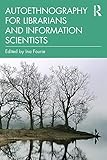Autoethnography for librarians and information scientists / edited by Ina Fourie.
Material type: TextPublisher: Milton Park, Abingdon, Oxon ; New York : Routledge, 2021Description: 1 online resourceContent type:
TextPublisher: Milton Park, Abingdon, Oxon ; New York : Routledge, 2021Description: 1 online resourceContent type: - text
- computer
- online resource
- 9781003014775
- 1003014771
- 9781000400304
- 1000400301
- 9781000400311
- 100040031X
- 020.72 23
- Z669.7
Part I: Introduction to autoethnography as research method for librarians -- What is autoethnography? / Ina Fourie -- Using autoethnography as a tool for critical reflection on library practice: making the case / Anne-Marie Deitering -- Part II: Different types of autoethnography -- Evocative autoethnography -- evoking is as evoking does / Lisa P. Spinazola, Carolyn Ellis & Arthur Bochner -- Analytic autoethnography / Ina Fourie -- Collaborative autoethnography as method and praxis: understanding self and others in practice / Kathy-Ann Hernandez -- Part III: Challenges of autoethnography -- "How does this move us forward?": A question of rigour in autoethnography / Tim Gorichanaz -- Ethical challenges and protection of privacy / Anika Meyer & Ina Fourie -- Supplementary and alternative methods: Dervin's sense-making methodology / Christine Urquhart & Louisa Lam -- Part IV: Authoethnography in contexts -- Moments of illumination: a personal experience narrative of cultural competence / Fiona Blackburn -- Autoethnography, law enforcement and an opportunity for libraries / Naailah Parbhoo-Ebrahim & Ina Fourie -- Caregiving and autoethnography -- a librarian perspective reinforced by experience as an academic and researcher / Olívia Pestana -- Part V: The way forward -- Taking on social challenges, personal growth and keeping momentum as autoethnographic reader and writer / Ina Fourie -- Reflection and concluding remarks / All contributing authors -- Appendix A: Bibliography of autoethnography in library and information science -- Appendix B: List of website addresses -- Appendix C: Further reading from related fields.
"Autoethnography for Librarians and Information Scientists illustrates that autoethnography is a rich qualitative research method that can enhance understanding of one's own work experiences, whilst also facilitating the design of tailored experiences for a variety of audiences. Starting with the position that librarians and information scientists require deep insight into people's experiences, needs and information behaviour in order to design appropriate services and information interventions, this book shows that using only conventional methods, such as questionnaires and focus groups, is insufficient. Arguing that autoethnography can provide unique insights into users' cultural experiences and needs, contributors to this volume introduce the reader to different types of autoethnography. Highlighting common challenges and clarifying how autoethnography can be combined with other research methods, this book will empower librarians and information scientists to conceptualise topics for autoethnographic research, whilst also ensuring that they adhere to strict ethical guidelines. Chapters within the volume also demonstrate how to produce autoethnographic writing and stress the need to analyse autoethnographies produced by others. Autoethnography for Librarians and Information Scientists is essential reading for any librarian, information scientist or student looking to deepen their understanding of their own experiences. It will be particularly useful to those engaged in the study of service provision, user studies and information behaviour"-- Provided by publisher.
OCLC-licensed vendor bibliographic record.



There are no comments on this title.